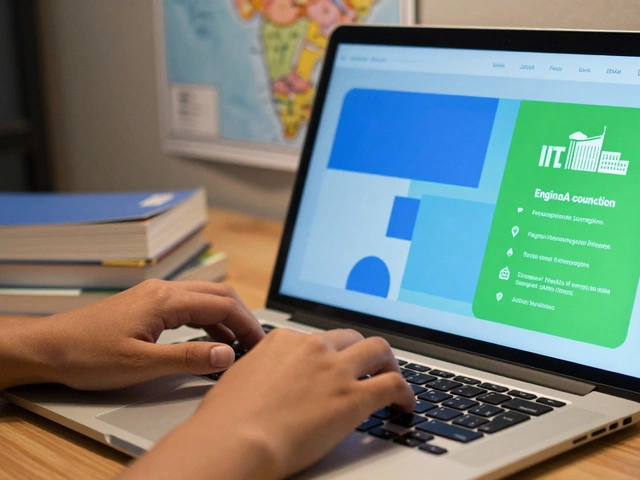
Ever wondered why some people have that unyielding fire for competitive exams, while others shy away at the thought? Competitiveness is not just about a natural desire to win; it's a whole package of mindset, motivation, and methods. So what sets the go-getters apart?
At the heart of competitiveness is motivation. For some, it's the thrill of challenge; for others, it's the promise of a better future. Understanding what drives you is essential. Without clear motivation, it's easy to burn out before reaching the finish line.
But motivation alone isn't enough. You need strategy. That means having an efficient study plan that targets your weaknesses and builds on your strengths – kind of like having a GPS for your brain power. And don't fall into the old cramming trap; smart planning is about consistent effort.
Yet, there's a fine line between healthy competition and an unhealthy obsession. Balancing ambition with well-being is crucial. That means taking care of your mental and physical health, so you're not just surviving the exam race – you're thriving.
- The Nature of Competitiveness
- Motivation as a Key Factor
- Strategic Study Techniques
- Balancing Ambition and Well-being
The Nature of Competitiveness
Why do some folks always aim to come out on top, especially in competitive exams? Well, competitiveness is like a cocktail of personality traits and environmental influences. It's about the mix of wanting to improve, a sprinkle of natural talent, and a good dose of learned behavior.
Competitive exams are unique because they aren't just about knowing stuff; they're about proving you're the best among peers. So, what motivates this hustle? First off, there's the intrinsic push – you know, the personal drive to overcome challenges. For some, this is a natural personality trait. If you were the kid always trying to outspell your classmates, you know what I mean.
The Role of Environment
The environment plays a massive role too. If you grew up in an atmosphere that praised achievement – like being always told that taking part isn't enough, winning is – that's bound to stick. Plus, having role models or being part of study groups can stoke that competitive fire.
Evolutionary Aspect
Some folks argue there's an evolutionary angle too. Participating in competitive exams can mimic scenarios where our ancestors had to outdo rivals for resources or mates. Winning gives a sense of achievement and position, a throwback to our survival instincts.
Personal Goals and Peer Pressure
Don't forget personal goals and peer pressure. The guy sitting next to you aiming for an Ivy League? That can push you harder. Sometimes, just wanting to climb the social ladder or proving yourself can be intense motivators. It's about setting the bar and then working your way over it.
| Type of Competitiveness | Description |
|---|---|
| Intrinsic | Comes from within, personal drive |
| Extrinsic | Driven by external rewards |
Understanding the roots of your competitiveness can help you work it to your advantage. It boils down to figuring out if you're driven by internal or external factors and using that knowledge to fuel your prep strategy.
Motivation as a Key Factor
Why are some people ready to tackle competitive exams head-on, while others see them as daunting? The answer often lies in motivation. It’s like fuel for your ambition engine and without it, even the best study plan can flop.
Motivation varies from person to person. Some are driven by the thrill of beating the odds. Others see exams as a stepping stone to their dream career, which means financial freedom or personal satisfaction. What's crucial is finding what lights your fire. Is it the respect that comes with acing a tough exam? Or is it about proving something to yourself or others?
Intrinsic vs. Extrinsic Motivation
Understanding the types of motivation helps. Intrinsic motivation comes from within. It’s like having a personal cheerleader whispering, “You can do this!” This type is usually long-lasting and self-sustaining. On the flip side, extrinsic motivation is all about external rewards. Whether it's applause, money, or a new gadget, these are carrots on a stick.
Setting Clear Goals
It's not enough to want to do well; you need clear goals. Setting SMART (Specific, Measurable, Achievable, Relevant, Time-bound) goals turns your vague dreams into actionable plans. Instead of just saying, “I want to pass,” aim for “I’d like to score above 80% by the next exam.” This gives clarity and direction, and when you achieve these mini-milestones, your motivation gets a boost.
Real-Life Case Study
Consider Aisha, a student preparing for medical entrance exams. Her biggest motivator? She envisions herself saving lives and making her family proud. By keeping this vision in mind, she studies not just with her brain but with her heart. She turned her room into a visual board of her aspirations, complete with inspiring quotes and pictures of her future medical school.
When you harness motivation effectively, it acts like a GPS - guiding and steering you through the toughest exam preps. Remember, it’s all about tuning in to what truly drives you and using it to power through challenges. Just imagine crossing the finish line and achieving your dream with unwavering drive!

Strategic Study Techniques
Ever felt like hitting the books is more about quantity than quality? Well, it doesn't have to be that way. When it comes to competitive exams, strategic study methods can make all the difference.
Create a Study Roadmap
First things first, let's talk planning. Imagine your study plan as your personal game plan. Figure out what subjects and topics are your strong points and which need more work. A clear roadmap can prevent you from feeling overwhelmed.
Break it Down
The big books can look scary, right? Break things into bite-sized chunks. That means digesting information in small, manageable sections rather than cramming at the last minute. Trust me, it helps retain stuff longer.
Active Recall and Spaced Repetition
Here's where the magic happens. Use active recall to test yourself regularly—it’s about retrieving information from memory—much more efficient than passive reading. Combine that with spaced repetition, where you review material at intervals, and you're onto a winner.
Practice Tests
It’s simple: practice makes perfect. Mock exams help. You're not just testing your knowledge but also getting comfy with the exam format. Plus, identifying weak spots becomes easier.
| Technique | Benefit |
|---|---|
| Active Recall | Increases memory retention |
| Spaced Repetition | Improved long-term knowledge |
| Practice Tests | Enhances exam performance |
Group Study
Sometimes, two heads are better than one. Group study sessions can bring different perspectives and explanations you might not consider on your own. Plus, teaching others is a fantastic way to consolidate your own learning.
Use these techniques to keep your study sessions smart, effective, and efficient. Remember, smart study tips are more about understanding and engagement, not counting the hours you spend studying.
Balancing Ambition and Well-being
Getting wrapped up in the world of competitive exams can be intense, but let's face it, success means nothing if you're burnt out. Finding that sweet spot between chasing your goals and keeping your sanity is crucial. Here's how you can manage your ambition while staying grounded.
Understand the Importance of Breaks
First up, breaks aren't optional—they're essential. Studies show that taking regular breaks can improve focus and productivity. Think of it like a pit stop in a race; without one, even the fastest cars will falter. So, schedule in short breaks to refresh your mind.
Create a Balanced Schedule
A well-thought-out study plan isn't just about cramming every minute. It's about spacing out study sessions, downtime, and sleep. Yes, sleep! Pulling an all-nighter might seem tempting, but research has shown that adequate sleep is a game-changer for memory and concentration.
Practice Mindfulness
Mindfulness isn't just for yogis. Techniques like deep breathing or short meditation sessions can significantly reduce stress. Spending even just 10 minutes a day practicing mindfulness can help you keep anxiety at bay—even when exam pressure peaks.
Build a Support Network
Don't go it alone. Share your ups and downs with friends, family, or study groups. Having a support system keeps you connected and provides that much-needed perspective when things get overwhelming.
Know When to Seek Help
If the pressure gets too much, it’s okay to ask for help. Schools and colleges often have counseling services. Reaching out isn't a sign of weakness; it's taking charge of your own well-being, which is the ultimate power move.
By balancing your ambition with well-being, you're setting yourself up for sustainable success—and that's the kind of winning strategy everyone could use.




